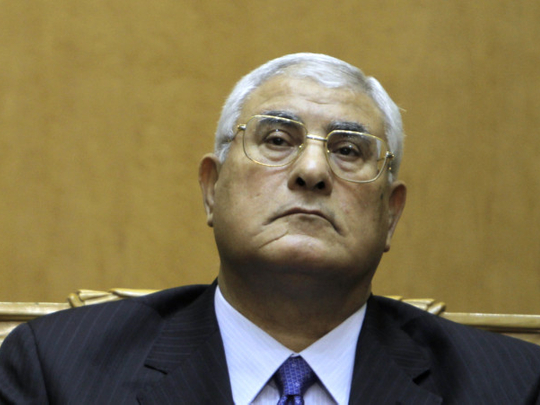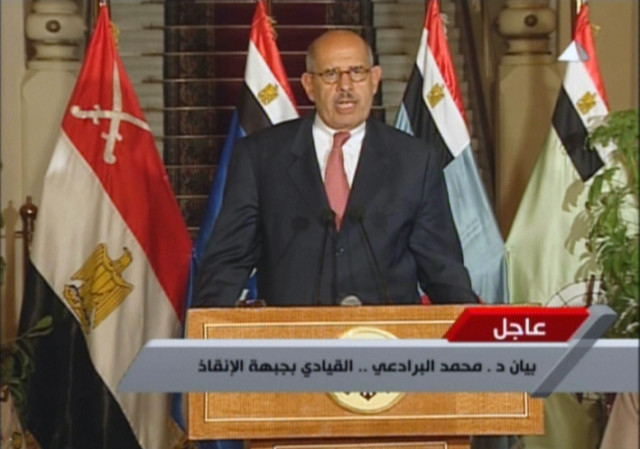
Cairo: When he was appointed last August as defence minister by the then Islamist President Mohammad Mursi, Abdul Fatah Al Sisi was almost unknown to the ordinary Egyptians. He was even suspected as having links to Mursi’s Muslim Brotherhood, whom the opposition accused of seeking to monopolise power and tighten hold on state institutions.
A dramatic perception of Al Sisi came last month when he gave the country’s political factions, including the ruling Brotherhood, a week-long ultimatum to end a political impasse that crippled Egypt for months.
Al Sisi’s popularity further rose last week when he issued a stern warning, giving Mursi 48-hour ultimatum to “respond to the people’s demands”.
Born in November 1954 in the Cairo quarter of Khan Al Khalili, Al Sisi graduated from the Military Academy in 1977. He obtained a master’s degree in military sciences in 1987 and got training in Britain and the US. He also served as Egypt’s military attaché in Saudi Arabia and the commander of the Military Northern Zone under the rule of Hosni Mubarak.
Al Sissi was appointed the chief of the military intelligence service after Mubarak’s fall in 2012. He also became the youngest member of the Supreme Council of the Armed Forces, which ruled Egypt for 16 months after Mubarak’s overthrow. Al Sissi is married with three children.
A Mursi-appointed judge takes Egypt’s helm
Almost a month before his ouster by the Egyptian army, Islamist president Mohammad Mursi appointed Adly Mansour as the chief justice of the Supreme Constitutional Court, Egypt’s top court.
Mansour was to start doing the new job on July 1. But a deep political dispute between Mursi of the Muslim Brotherhood and the secular opposition prompted the powerful army to topple him and name Mansour as the country’s interim president.
Mansour, who is not a well-known public figure, took the oath as president on Thursday. He will serve in the post until an early presidential election is held. No specific date has been set for the vote.
Born in December 1954, Mansour earned a bachelor’s degree in law at Cairo University in 1967. He went on a two-year scholarship to France in 1975. In 1983, he went to Saudi Arabia where he worked as an advisor to the Ministry of Commerce for seven years.
In 1992, he became the deputy chief of Egypt’s Supreme Constitutional Court where he was promoted in June 2012 as the first deputy chief justice. In May this year, the court’s general assembly selected him to be its new head, replacing Maher Al Beheiry who reached the retirement age last month. Mansour’s appointment was later approved by Mursi. Mansour is married with three children.
Nobel laureate – an inspiring fighter against dictators.
In a space of three years, Egypt’s Nobel peace prize winner, Mohammad Al Baradei, have played an inspiring catalyst for the fall of two dictators. After ending his term as the head of the International Atomic Energy Agency, Al Baradei returned to the homeland in 2010 when he led a reform campaign against the then president Hosni Mubarak. Months after Mubarak’s fall, Al Baradei said he would not run for president in protest against the military who took over after Mubarak.
Having kept a low profile for some months, Al Baradei staged a comeback to politics after Mohammad Mursi of the Muslim Brotherhood became Egypt’s first democratically elected president.
Last year, Al Baradei, who won the Nobel Peace Prize in 2005, set up the liberal Al Destur (Constitution) Party and became a vociferous critic of Mursi and his Islamist group.
In May this year, Al Baradei, 71, threw his weight behind the opposition youth movement Tamarod, which launched a protest campaign calling for Mursi’s resignation and holding early presidential elections.
Al Baradei was among the political and religious leaders, who discussed with the army a post-Mursi roadmap, which includes suspending the contentious constitution drafted by an Islamist-dominated assembly. The ex-diplomat has said he does not plan to run in the next presidential election. He is married with two children.














